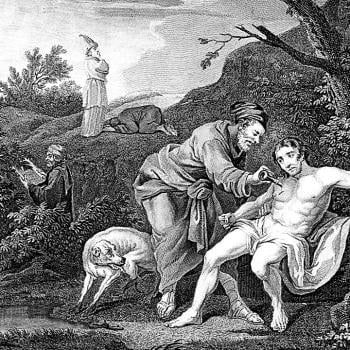In the summertime when I go to my sister’s house, my nephews and niece love to blow bubbles outdoors. The little one especially, she gets so excited to see them. They run after them to pop them, and they love the really big ones. There is so much excitement for something as simple as a bubble which is made of water and soap; so much excitement for something that lasts for just a few seconds.
“Vanity of vanities, says Qoheleth, vanity of vanities! All things are vanity!” These are the words of an old, wise man, who in his old age, has learned a valuable lesson. He has learned that after much work and toil, his life will come to an end, and he will not take any of his material possessions with him – all that he has worked for will be inherited by, he says, “another who has not labored over it.” Qoheleth has come to acknowledge that everything in this world is passing away. Everything is like a bubble; it doesn’t last forever.
A line of Psalm 90 has always caught my attention, it says, “life is like a flower that blooms in the morning and withers at night.” Life is quick – frail.
How do we respond to this reality? The fact we leave this world in the same way we arrived into it: naked and with absolutely nothing.
There is a family squabble going on in the Gospel passage today: a brother demands his part of the inheritance from his brother. Jesus responds, “take care to guard against all greed. For though one may be rich, one’s life does not consist of possessions.”
The value of my life does not depend on what I have, nor does it depend on what I achieve. My life has value because I have been created by God. Why do we sometimes chase after possessions, spending much precious time and energy, if ultimately, there are greater things?
So often we become overly preoccupied with what we wear or how we look. We fear that we will be judged by others: we worry about what car we drive, sometimes we may embellish the truth to impress others so they think more of us, be it family or at work, other times we end up spending money we do not have on things we do not need, simply because we want to impress others or to fill a need for “more.”
When it comes to the material world, the Gospel teaches us detachment: to enjoy the things of the world, but to realize that these will eventually leave us wanting for more because they ultimately do not satisfy. They do not quench our thirst for more and more. We can enjoy pleasure, power and money to the extent that we do not sin, but recognize that these will pass away. We use them, appreciate them, and then let them go, without building our identity or value based on them.
The man in the parable built barns that were bigger and bigger. Likewise, don’t we build bigger and bigger barns? Not just for our stuff, but also whenever we yearn for recognition, praise, and honor. We always want more. Greed is not just about money – it’s about wanting more of everything. We can get caught in an addictive pattern when we cling to the goods of the world, they are never enough!
“If only I achieve this, then I’ll be happy. If only I have that, then I’ll be happy.”
The barns get bigger and bigger, and we fill them up. The more we cling to the goods of the world, the more we become imprisoned to them because we want more.
“You fool!” God says to the man in the parable. Your life will end today. Will God ask what you kept in those barns? Or will he ask how you gave of yourself to others? How you loved and sacrificed for the sake of others? This is the paradox of our faith: we take with us only the things we give away.
Bishop Robert Barron proudly quotes Cardinal George of Chicago who said, “The only thing you take with you into the life to come, is what you’ve given away on earth.”
We will take with us the quality and quantity of the love we have given away. Not our barns.
Picture from Public Domain













